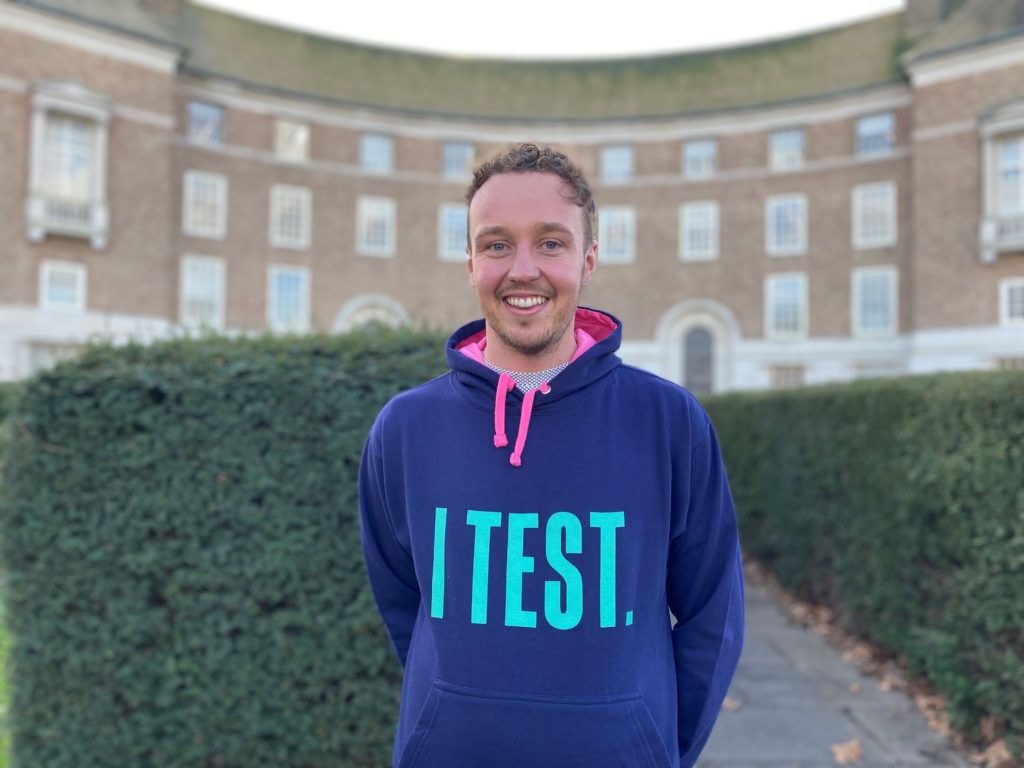This year’s National HIV Testing Week is the 5th to 11th February, and Somerset Council’s Public Health team are using this opportunity to encourage people to look after their sexual health by getting a test, particularly if they have had unprotected sex or have multiple partners.
National HIV Testing Week takes place every year to raise awareness on the importance of HIV testing, to promote prevention and to reduce the stigma surrounding HIV / AIDS. This year, the campaign strapline ‘I Test’ returns and the week serves as a crucial reminder that knowing your HIV status is a key step in maintaining good health and preventing the spread of the virus.
HIV can affect anyone, but huge advances in treatment mean that those living with HIV can lead stable and healthy lives without worrying about passing the virus to others. Treatment is now so good that very few people with HIV in the UK develop AIDS, but early diagnosis is key. In Somerset nearly one in two new HIV diagnoses are late which leads to poorer health and increased transmission.
Testing for HIV is free, confidential, quick and easy, and puts you in control.
There are a number of ways to test, including:
- Self-testing at home: ordering a test at freetesting.hiv this site offers a test where you just need a finger-prick blood sample and read your own result immediately at home or a blood sample you send off and get results usually within 72 hours of posting.
- Somerset Wide Integrated Sexual Health Clinics (Swish) can offer a blood test where you get your results within 20 minutes.
Free testing is available at:
- Free Testing HIV – freetesting.hiv
- SWISH Services – to find a drop in HIV testing near you visit – Swish Services or call 0300 1245 010
- The Eddystone Trust – eddystone.org.uk/pages/testing
- Your local GP/Doctor
Cllr Adam Dance, Lead Member for Public Health, Equalities and Diversity at Somerset Council, said:
People can live with HIV for a long time without any symptoms, testing is the only way to know your HIV status.
If you have HIV, finding out means you can start treatment, stay healthy and avoid passing the virus onto anyone else.
I test as a routine part of looking after my own health and I would encourage anyone who is unsure of whether they may have contracted HIV to use this opportunity to get a free, confidential test.
Dr Kanch Seneviratne, Consultant GUM/HIV from Somersets Sexual Health Services said:
HIV does not have the awareness it should due to the stigma around talking about sex or testing for sexually transmitted infections like HIV.
Let’s challenge that stigma and make testing for HIV and living with HIV a normal thing!
Advancements in treatments have transformed this disease meaning most people with HIV have a normal life expectancy and effective treatment means they cannot pass on HIV to anyone through sex. You can now take one tablet every day or an injection every couple of months, so you do not even need to take tablets every day.
Testing for HIV is so important because if you don’t test you cannot benefit from knowing your status: whether positive or negative. If you test negative, you have access to prevention advice and medications so you can continue to stay negative. If you test positive, you have access to effective well tolerated treatments meaning you live a normal life and can be confident that you cannot pass HIV to anyone. So, test and whether it is negative or positive you can enjoy the benefits of knowing.
Everybody and anybody having sex at any age can get HIV. Testing is easy, quick, free, and confidential. You can even test at home. A finger prick test is all it takes. Make the decision to keep yourself healthy. Do it for you, your partner, your family, or your community.
James Mead, Service Development Lead (Prevention) from The Eddystone Trust said:
In the UK, 1 in 16 people living with HIV don’t know that they have the virus. This is why we want to promote the message that testing for HIV can be done in a variety of ways and settings. We can now obtain a result from doing a swab of the gums. These tests take 20 minutes to provide a result and can be done where you feel most comfortable.
As we work towards the target of No New HIV Diagnoses by 2030, we want to ensure that we are encouraging as many people as possible to test. Regular testing helps to reduce numbers of undiagnosed people and prevent people being diagnosed late. Normalising testing, starting conversations around HIV, and raising awareness can help to remove barriers people may have whilst reducing stigma against those living with the virus.
For more information on HIV, visit www.eddystone.org.uk.

